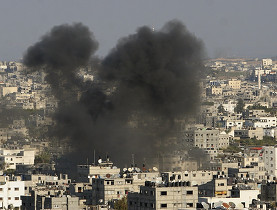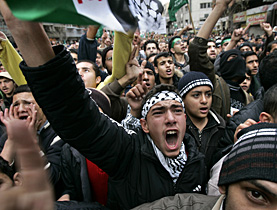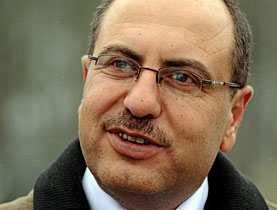Swiss aid workers describe crisis in Gaza

Israeli ground forces entered Gaza on Saturday, eight days after the start of intensive air raids on the Palestinian territory.
The Swiss foreign ministry issued a statement on Sunday afternoon calling for an “immediate cessation of hostilities”.
“Rocket fire by Hamas as well as Israeli military operations must stop in order to put and end to the suffering inflicted on civilian populations,” it said.
It called on both sides to respect international humanitarian law, “including the protection of civilian populations, access to victims and the law of proportionate response”.
Swiss aid workers on the spot described the situation on Sunday as a humanitarian crisis.
“For days trucks with humanitarian supplies have not had access to Gaza,” Mario Carera, head of the office of the Swiss Agency for Development and Cooperation (SDC) for the Palestinian territories, told the Swiss news agency.
“Since there is no fuel, there is no more water and no more electricity… The cease fire calls must be heard. The civilian population should not be held hostage to the fighting,” he said.
Another Swiss, Suzanne Leuenberger, of the United Nations Relief and Works Agency – the body that looks after the needs of Palestinian refugees – echoed his remarks.
“We are in the midst of a humanitarian crisis in Gaza, contrary to the claims of the Israeli leadership,” she said.
Supplies blocked
Anne-Sophie Bonefeld, a spokeswoman for the Swiss-run International Committee of the Red Cross (ICRC) said that the organisation’s trucks, full of medical supplies, were blocked at the entry points to Gaza. She added that it was also very risky to distribute the supplies already in the Strip, and that its own workers had to be protected.
In a statement issued in Geneva on Saturday the ICRC said the Israeli authorities had prevented an emergency medical team, including a surgeon specialising in war injuries, from entering Gaza.
The foreign ministry has called on the Israeli authorities to allow its passage “as soon as possible”. It said it was in contact with the Israelis over the issue via its embassy in Tel Aviv.
The Swiss children’s charity Terre des Hommes on Sunday spoke of a “massacre” of children in the Gaza Strip and said 72 children had so far died in the Israeli air attacks and ground offensive.
It called on Switzerland as the depository nation of the Geneva Conventions to fulfil its obligations towards the civilian population, to ensure that humanitarian aid is provided and the blockade is lifted.
Israeli ambassador
The Sunday editions of the German language SonntagsBlick and French language Matin Dimanche newspapers carried an interview with Israel’s ambassador in Bern, Ilan Elgar, who said his country “does not like killing”. He added that the Israeli army always telephones Palestinians to warn them to leave their houses when there is about to be a raid.
According to UN sources, even before the ground attack started at least 433 people had been killed, and more than 2000 injured. A quarter of the victims were reported to be civilians – something Elgar denied.
Israel has also consistently denied that there is a “humanitarian crisis” in Gaza.
Swiss aid
Since the signing of the Oslo accord of 1993, which among other things created the Palestinian Authority and put more power into the hands of the Palestinians, Switzerland has had its own programme in the West Bank and Gaza aimed both at development and at promoting good governance.
The pillars of the programme are the promotion of human rights, economic development and institution building, with the aim of creating a viable Palestinian state.
Partners in Gaza include the Gaza Community Mental Health Programme, the Welfare Association, which runs employment generation projects, and the Agricultural Development Association, as well as international organisations active in the Palestinian territories.
Current situation
Since the outbreak of the fighting more than a week ago the SDC has monitored as best it can the situation of its partners in Gaza.
“A Palestinian employee of the SDC in Gaza delivers short reports on the situation and is in continuous contact with SDC’s local partner organisations in Gaza – mobiles and internet are still working,” Toni Frisch, SDC deputy director-general, and head of its humanitarian aid department, told swissinfo by email.
One of the SDC partner organisations, the Gaza Community Mental Health Programme, last week reported massive damage to its main building, incurred when a police station 70 metres away was bombed. Ceilings and walls were badly cracked, and furniture was destroyed.
As Frisch explained, Israeli air strikes target the homes of Hamas members, but in the densely populated Strip this risks damaging the civilian infrastructure as well.
Prospects
As for whether the current events will have any impact on Swiss policy in Gaza, Frisch said that projects with good governance components are still of “utmost importance”, and are not called into question by current events.
Switzerland maintained its projects in Gaza even after Hamas took power there in June 2007. This is in accordance with Switzerland’s policy to maintain dialogue with all parties and actors, Frisch explained.
“There has never been direct support by SDC to Hamas or a Hamas affiliated organisation,” he added.
“Support of the Gazan communities in the field of mental health, economic support (especially in agriculture) and youth programmes correspond to urgent needs and strengthen local capacities.”
The current fighting will certainly have an impact on Swiss activities.
“The SDC is constantly rethinking the way of working in a context that is continuously changing and politically very sensitive,” Frisch said.
“The consequences of the fighting will probably call for intensified humanitarian efforts. When the current hostilities end, Switzerland will reassess the situation. New priorities will certainly emerge.”
swissinfo, Julia Slater
The Gaza Strip is a strip of land on the eastern Mediterranean coast about 41 kilometers long and 12 kilometers wide at its widest point, a total of 360 square kilometres.
It is bounded by Israel to the north and east, and Egypt in the south.
It has a population of about 1.5 million, giving it a population density of over 4,000 per square kilometre.
The bulk of the inhabitants are refugees, or descendants of refugees, forced to leave their homes in what is now Israel when the State of Israel was established in 1948.
From 1948 to 1967 Gaza was administered by Egypt.
In 1967 Israel occupied the territory and created 21 Jewish settlements there.
After the Oslo accords of 1993, the Palestinian Authority took over the administration, leaving only the settlements and military areas under Israeli control.
Israel withdrew completely in 2005, but retained control of the border points.
In Palestinian legislative elections in 2006, Hamas won a clear victory.
After a struggle with the Fatah party of Palestinian president Mahmud Abbas, Hamas took control of the Gaza Strip in June 2007.
Many aid donors have refused to deal with it, on the grounds that it is a terrorist organisation.
Israel has kept the territory under a tight blockade since June 2007, allowing through only the minimum of supplies.
Palestinian militants meanwhile fired rockets into southern Israel, in particular at the town of Sderot close to the border.
A six-month ceasefire agreed between the two sides in June 2008 was not renewed when it ended in December.

In compliance with the JTI standards
More: SWI swissinfo.ch certified by the Journalism Trust Initiative













You can find an overview of ongoing debates with our journalists here . Please join us!
If you want to start a conversation about a topic raised in this article or want to report factual errors, email us at english@swissinfo.ch.